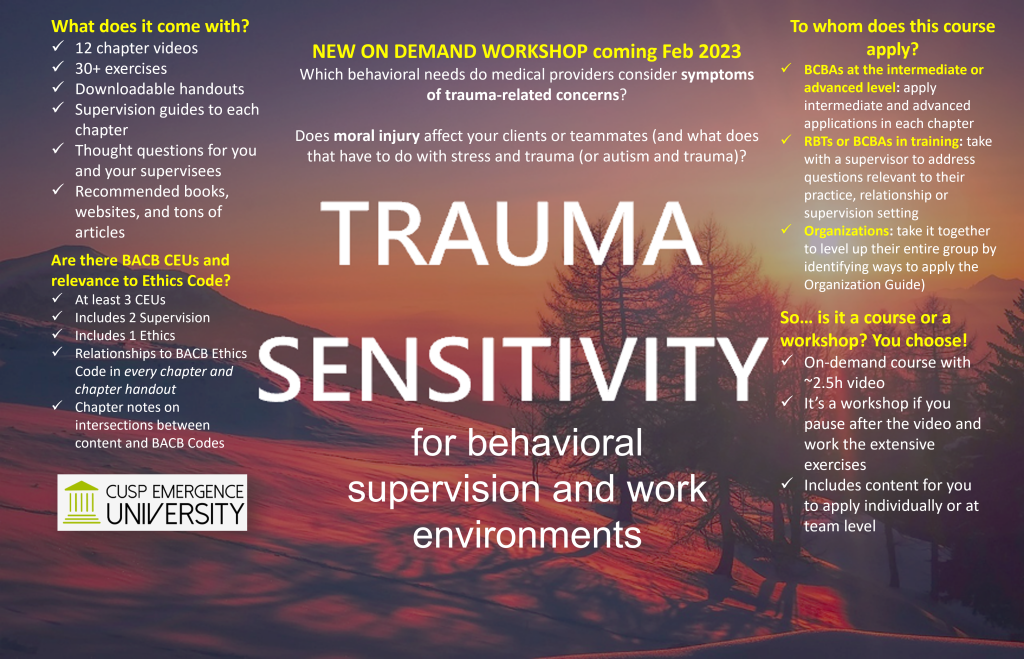Tags
BACB CEU, bacb ethics ceu, bacb supervision ceu, bcba-d courses, camille kolu, camille parsons, CuspEmergenceUniversity, ethics ceu, kolu, new course, on-demand workshop, supervision CEU, teresa kolu, trauma sensitivity, trauma sensitivity workshop, trauma-informed behavior analysis
For me, an on-demand workshop does several things: It can be taken any time; one can take it with a group and apply exercises with other people if desired; but since it’s on-demand, an individual will benefit even if taking it solo. It should be expandable if one wants to be able to sit with a chapter for a few extra hours because we simply love the content; there will be resources to grow with and come back to if one can’t do all the exercises right NOW. I’ve been on sabbatical a while; as I return to doing interviews, conferences, talks, and podcasts (including a new one we taped recently for the Atypical Behavior Analyst, with my friend Dr. Eddie Fernandez airing later), it is nice to be able to take something on my own time, when tiny folks are asleep, and I know many parents – and folks going through school and work at the same time – are in the same boat.
So after taking an on-demand online workshop recently, we decided to present some of our own new content in an expandable workshop format instead of the typical course, including several features. Our new Trauma Sensitivity workshop includes:
- 30+ exercises with the videos: Because this is an on-demand workshop, we present a TON of exercises packaged with the videos. Teams or individuals can easily do a chapter a week along with exercises for a truly transformative experience in your office or supervision setting. But if they choose to take it all at once in an afternoon, that’s possible too. So it’s customizable.
- Scalable applications for team members, supervisors and supervisees: The new content (on leveling up the trauma sensitivity of our staff and client environments) is “scalable”, meaning we include applications for 3 different levels of staff: those in roles that are basic; intermediate; and advanced. Presenting it as a workshop meant that the team members “leading” the discussions and exercises benefit just as much as (but different from) the less advanced team members they are mentoring through it.
- Supervision guides and chapter handouts: These come with every chapter video and walk the student through the material, from the main ideas we presented, to definitions for any new vocabulary, exercises, lists of Ethics Code items that relate, thoughtful discussion questions, exercises, and chapter resources and articles. Every chapter comes with its own handout and supervision guide to help BACB supervisors or team leaders support our coworkers and supervisees.
The two things I personally love most about this workshop are:
- it addresses tough topics like moral injury with your team members and considering how this ethics area could apply to our supervisees but our clients too;
- and we provide resources to follow up on big ideas like this one: there are some behavioral needs that medical providers consider symptoms of trauma-related concerns. (If folks are new to integrating trauma sensitivity in their supervision and client environments, we might miss this huge opportunity to make sure we do no harm by treating behavior needs that are actually related to new abuse.)
Wondering about the content of the new workshop? Here are the chapters (each has its own video, ethics intersections, resources, thought questions, and exercises):
| Chapter 1: Principles of Trauma-Sensitive Care |
| Chapter 2: Interactions that could help or do harm |
| Chapter 3: Features of trauma-related responding |
| Chapter 4: Defining trauma |
| Chapter 5: Risks related to trauma |
| Chapter 6: Elements of a potentially trauma-related response |
| Chapter 7: Buffers |
| Chapter 8: Triggers (Then watch integration Scenario Video) |
| Chapter 9: Neurodevelopment |
| Chapter 10: Want to mitigate risk? Document it first |
| Chapter 11: Skills and Stress |
| Chapter 12: Healthy Collaboration |
Did you enjoy this article? Come back soon when we’ll cover a few more related topics including: mentorship groups for those applying trauma sensitivity principles in their supervision sessions; how to get the most out of your workshop experience by doing exercises as a group or dyad; more info on a brand new all-trauma conference coming in April hosted by the formidable Dr. Gabi Morgan; meetups in Denver May 2023; and more!
Read below for final thoughts and some links if you’re in the market for values related CEUs: Recently, when my own CEU cycle was about to turn over, I knew it was time to take a course or workshop in something I could use NOW and am passionate about… so I went searching for three things: supervision CEUs; offerings from people I admire and from folks who literally wrote the books on leveling up mentorship and supervision and working with families; and opportunities to learn about values in a deeper way that would help me level up my own practice. That led me to a couple of great courses and podcasts; one of these opportunities was a workshop with built in exercises that could be taken quickly or over the course of a few weeks and included opportunities to network with other folks. It was a really lovely experience. Included are links to a couple trainings and podcasts from respected folks who continue to inspire, below.
https://podcasts.apple.com/us/podcast/the-journey-of-supervision/id1501568747?i=1000485543749
https://evelyngouldphd.com/news/events/20220915-acting-on-a-value-of-self-care-on-demand/
https://www.weareconstellations.com/current-workshops
And here’s the trauma sensitivity on-demand workshop: https://www.cuspemergenceuniversity.com/courses/trauma-sensitivity

